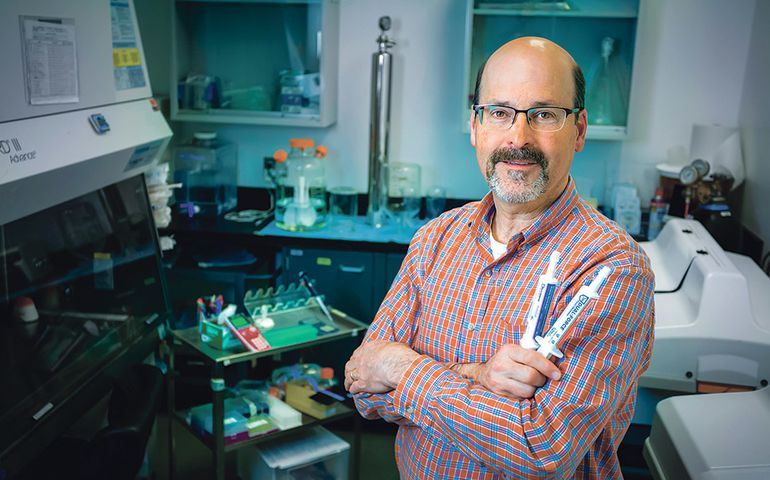An industry with a family tree: Much of Maine’s biotech industry grew out of two firms
Like some of its products, cultivated from the cells, strands and science of living organisms, Maine’s biotechnology industry has grown organically.
It dates to the mid-1970s founding of Ventrex Laboratories Inc., a diagnostic testing company in Portland, and the now-defunct Foundation for Blood Research.
Those two organizations led to the creation of more than 20 biotech businesses, says Gary Goodrich, a board member of the Bioscience Association of Maine. Today, more than 200 bioscience-related companies and organizations call the state home.
“Maine’s industry is a little cluster,” Goodrich says. “It crosses a lot of different areas.”
Some entrants to the field have been direct spin-offs, some merely a group of ex-employees from the same company. Over the years, some of the businesses have failed, been acquired or relocated.
Nevertheless, both of Maine’s publicly traded bioscience companies, Westbrook-based IDEXX Laboratories Inc. (Nasdaq: IDXX) and ImmuCell Corp. (Nasdaq: ICCC), of Portland, trace their ancestry to the initial generation.
IDEXX, a producer of veterinary diagnostic tests with annual sales of $2.2 billion, launched in 1983 as an offshoot of Ventrex. ImmuCell, which makes preventive health products for cattle, began in 1982. Its early staff included Ventrex personnel, and its first president, Frank Ruch, came from Atlantic Antibodies, a for-profit spin-off of the Foundation for Blood Research.
Ventrex was acquired in 1991 and moved to California; the Foundation for Blood Research, which had been based in Scarborough, closed in 2016. Maine’s bioscience industry has also been nurtured by other long-standing research organizations, such as Jackson Laboratory and MDI Biological Laboratory, both in Bar Harbor, and the Bigelow Laboratory for Ocean Sciences, in East Boothbay.
Today, the industry employs an estimated 6,600 people in Maine. Many have migrated from the much larger bioscience cluster in eastern Massachusetts, but Maine is also home-growing the workforce and creating “critical mass” of its own, according to ImmuCell’s current president, Michael F. Brigham.
“(The growth) is really about guys from here,” he says. “All those professionals aren’t just going to come out of Boston.”
IDEXX itself has spawned new businesses.
In 2010, founder David Shaw and his son, Benjamin Shaw, launched Vets First Choice, a pharmacy and technology provider for veterinary practices. Then, this February, Vets First Choice merged with the animal supplies business of Henry Schein Inc. (Nasdaq: HSIC) to form Covetrus Inc. (Nasdaq: CVET).
The Portland company’s estimated 2018 revenue of $4 billion is nearly twice that of IDEXX, and makes Covetrus Maine’s largest publicly traded company in terms of annual sales.
Such explosive growth is possible partly because of the company’s focus on animal health, according to Brigham, whose 50-person company has also been growing. ImmuCell completed a $9 million public offering in March and constructed a $20 million manufacturing facility in Portland in 2017.
Regulation, financing and other potential hurdles present a “much lower barrier to entry” in bioscience products for animals than for humans, Brigham says.
“It’s hard to start small in human health. There’s a much greater chance of being the next Covetrus than the next Amgen,” he says, referring to the California-based multinational company.
Another IDEXX offspring offers a more unusual pet product line: chews and oils that treat arthritis with compounds derived from hemp, a form of cannabis. ElleVet Sciences, of Portland, was launched in 2017 by Michael J. Williams and Christian Kjaer, both formerly senior executives at IDEXX.
It’s too early to tell if the treatment will catch on, even in a relatively marijuana-friendly state like Maine. But Goodrich, who founded Bioprocessing Inc. here in 1991 and sold it 11 years later, believes the state continues to provide a good environment for small, specialized start-ups.
“We didn’t have to be big,” he says of his former 20-person business. “A small company just has to find its own niche. For most of the bioscience companies in Maine, growth is organic — it’s bootstrapping. That’s the Maine way.”


















0 Comments